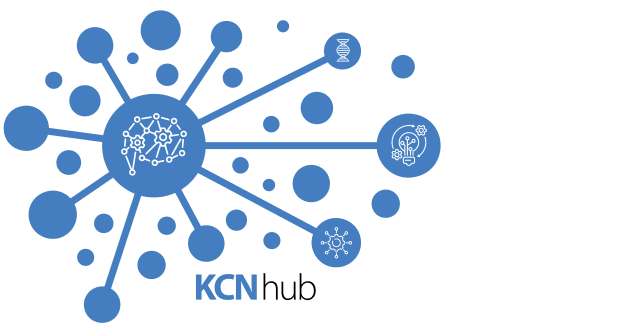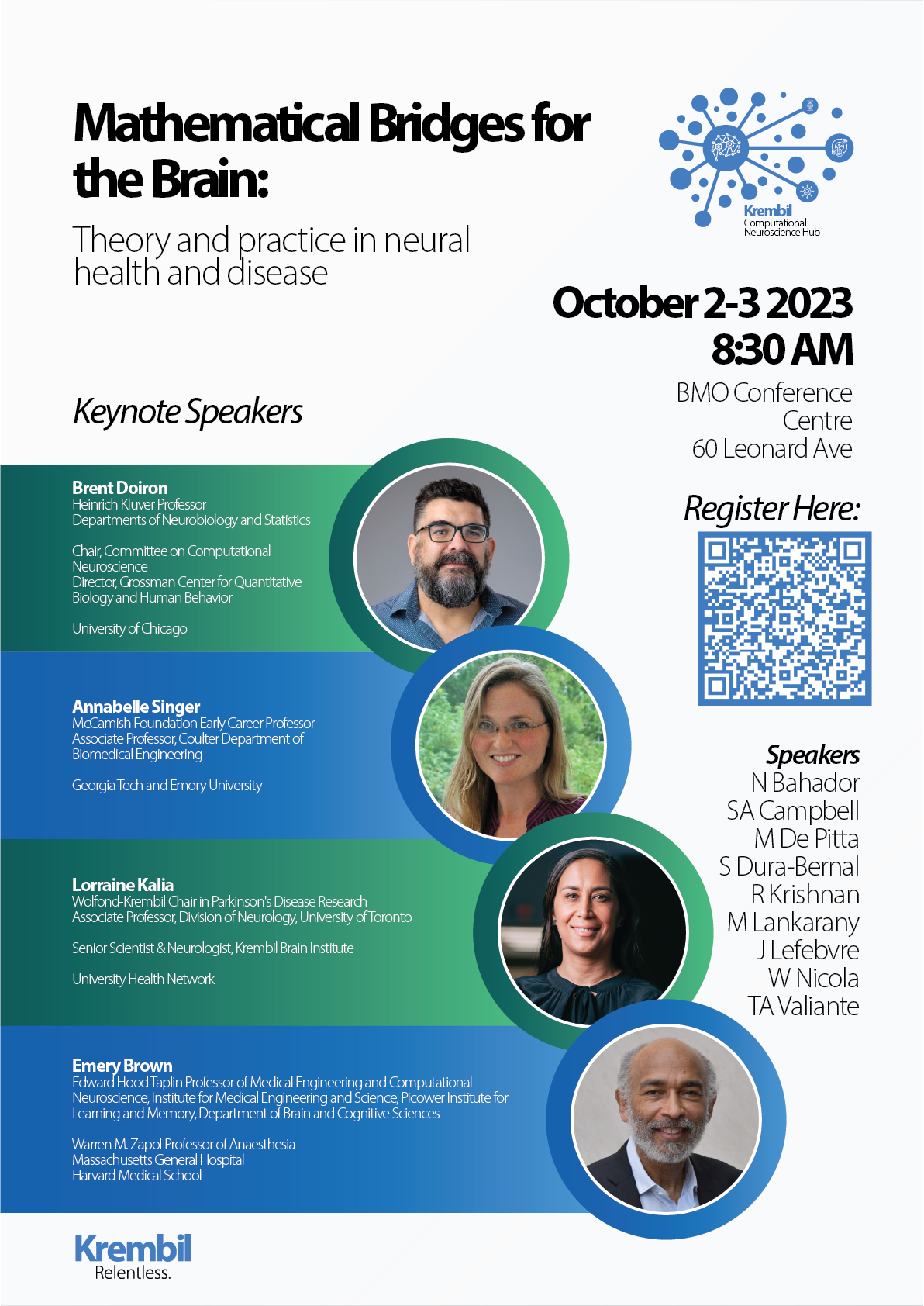Krembil Computational Neuroscience (KCN) Symposium: Mathematical bridges for the brain
Krembil Computational Neuroscience (KCN) Symposium
Mathematical bridges for the brain: Theory and practice in neural health and disease
will take place on October 2-3, 2023, hosted by the Krembil Research Institute, University Health Network.
Registration is now closed.
DAY 1 Agenda is HERE
DAY 2 Agenda is HERE
The Symposium will last one and half days: Monday Oct 2 from 8:30am-5:30pm, and Tuesday Oct 3 from 9am-1:30pm, and will encompass Fundamental, Quantitative and Translational Aspects in the Computational Neuroscience field. Onsite breakfast and coffee breaks will be provided, as well as lunch on the first day.
The goal of our KCN Symposium is to connect cellular and systems neuroscience with translational practices using fundamental and computational approaches. To this end, we are hosting a panel of speakers that highlights the intersection of mathematics, engineering, clinical, and experimental neurosciences, providing insights into the latest computational methods for understanding brain pathophysiology. At the same time, our Symposium aims to leverage multidisciplinary discussion and foster new opportunities for networking and synergistic interactions among participants.
The symposium is partnering with the Canadian Computational Neuroscience Spotlight (CCNS) to further highlight the burgeoning community of computational neuroscientists across Canada. The fourth edition of CCNS will take place virtually (via the Crowdcast platform) following the symposium, on October 5-6, and will feature contributions from dozens of trainees in computational neuroscience both within Canada and across the globe. Registration for the meeting is completely free. For more information, head to ccnsmeeting.ca to register for the meeting.
KCN Symposium AGENDA:
Speaker Bios/Abstracts (Day 1 - Monday)
Speaker Bios/Abstracts (Day 2 - Tuesday)
Monday Oct 2
8:30-9:00 Registration, Breakfast
9:00-9:15 Welcome: Jaideep Bains (Director, Krembil Research Institute, UHN)
Fundamental Session
Chair: J Lefebvre
9:15-10:15 Keynote: Brent Doiron (Chicago), "The dimensions of population variability in recurrent cortical circuits"
10:15-10:50 Maurizio De Pittà (Krembil), "Neuron-glial networks for working memory"
10:50-11:20 Break
Chair: TA Valiante
11:20-11:55 Jérémie Lefebvre (Ottawa/Krembil), "Intrinsic diversity promotes the resilience of neural circuits"
11:55-12:30 Sue Ann Campbell (Waterloo), "Exact mean-field models for neural systems"
12:30-2:00 Lunch on site
Quantitative Session
Chair: M Lankarany
2:00-2:35 Nooshin Bahador (Krembil), "Monitoring seizure development and drug response"
2:35-3:10 Wilten Nicola (Calgary), "Learning and memory in the paraventricular nucleus"
3:10-3:40 Break
Chair: M De Pittà
3:40-4:15 Salvador Dura-Bernal (SUNY), "Multiscale modeling of brain circuits to study brain function and disease"
4:15-5:15 Keynote: Annabelle Singer (Georgia Tech/Emory), "Learning from inhibition: Hippocampal interneurons unlock plasticity at new goal locations"
Tuesday Oct 3
8:30-9:00 Breakfast
Translational Session
Chair: L Milosevic
9:00-10:00 Keynote: Lorraine Kalia (Krembil), "How can computational methods be applied to drug discovery for Parkinson's disease?"
10:00-10:35 Rahul Krishnan (Toronto), "Machine learning in healthcare - models, algorithms and applications"
10:35-11:10 Taufik Valiante (Krembil), "Loss of neuronal heterogeneity in epileptogenic human tissue impairs network resilience to sudden changes in synchrony"
11:10-11:40 Break
Chair: FK Skinner
11:40-12:15 Milad Lankarany (Krembil), "Inferring and modulating latent state of conflict processing in verbal stroop task"
12:15-1:15 Keynote: Emery Brown (Harvard/MIT), "General anesthesia, neuromodulation and altered states of arousal"
1:15-1:20: Closing Comments (Organizers)
Lunch offsite
KCN Organizing Committee (alphabetical):
Maurizio De Pittà, PhD
Milad Lankarany, PhD
Jérémie Lefebvre, PhD
Luka Milosevic, PhD
Frances Skinner, PhD
Taufik Valiante, MD, PhD
We would like to acknowledge and express our utmost appreciation to the following individuals (alphabetical) for their organizational support:
Yijinmide Buren, David Crompton, Alan Diaz, Madeleine Falby, Isabelle Keegan, Andre Marin, Twayne Pereira, Vandana Prasad, Mohammad R. Rezaei, Spandan Sengupta, Panos Stefanaros, Zhenyang Sun, Julie Wan

